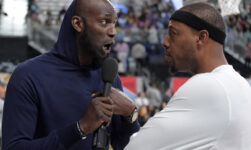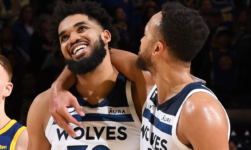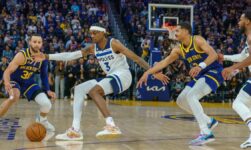Let’s begin by stating the obvious: Nikola Jokic is a worthy MVP, and his two-year run has been nothing short of phenomenal.
Several players had strong, if not stronger, cases to win the award given the precedent over the last 40 years or so. He didn’t get this voter’s first-place vote, though, because the Denver Nuggets were not a contender — through no fault of his own.
Jokic ran away with the award last year and had an even better campaign this year, averaging 27.1 points, 13.8 rebounds and 7.9 assists. He’s almost some combination of Larry Bird, a touch of Magic and what we would’ve seen from a healthy Arvydas Sabonis if he came over to the states before his body was beat up.
But a vote for someone else wasn’t an indictment on his play, just as a vote for him wasn’t a shot at Joel Embiid or Giannis Antetokounmpo, the only other players who received first-place votes. In the interest of disclosure, Antetokounmpo got this vote — for reasons that appear to be validated by his performance in the playoffs to date.
The discussion throughout the season was disheartening, though.
How many times did we hear (or read) “it’s impossible to vote for someone else?”, given that his numbers and advanced stats were astronomically good? It’s not a turnoff that would affect a rational voter’s entry, but it stifles conversation and diversity of thought.
The NBA doesn’t give a guideline for how each voter should consider the award, which isn’t a problem considering how diverse a swath the voting bloc is. It also adds to the mystique of the award without sterilizing it. Each voter’s criteria probably changes depending on the uniqueness of the season and their own evolving sensibilities.
The lack of an overall dominant team created an opening of sorts, even though dominance doesn’t guarantee consideration it can streamline the candidates. A voter’s top-five ballot looked totally different from the 30-game mark to the 60-game mark to the finish, yet it was like Jokic was somewhere near the top every time.
Story continues
That has to count for something.
Denver’s Nikola Jokic was near the top of the MVP discussion throughout the season, eventually winning the award, but the Nuggets were never in true NBA championship contention. (AAron Ontiveroz/MediaNews Group/The Denver Post via Getty Images)
Jokic was given extra credit in ways not normally applied to other players, historically. And it was under the guise of the media being “smarter” and more educated than ever, as information has become more sophisticated and layered with the rise of PER, win shares, value over replacement and offensive/defensive box score plus-minus.
And it’s important to note, plenty of those stats when applied to previous winners seem to hold up more times than not — even though no one was performing with those benchmarks in mind back then.
The Nuggets being without Michael Porter Jr. and Jamal Murray, his two co-stars, put more of a load on Jokic and singularly, he delivered. He kept the Nuggets afloat in the West, leading them to a respectable 48 wins.
Steve Nash going back-to-back in 2005 and 2006 could’ve served as a tentpole for Jokic’s argument. Nash won the award with the revolutionary “Seven Seconds or Less” Phoenix Suns the first year, then led the Suns to 54 wins after losing Amar’e Stoudemire to knee surgery. A second straight Western Conference finals appearance seemed to validate hoisting the trophy twice in a row.
It was definitely a “you had to be there” moment in history, but despite the crowing from Shaquille O’Neal in 2005 and the Kobe Bryant stans in 2006 (a year in which Kobe’s Lakers were knocked out by Nash’s Suns in the first round), Nash was certified.
Jokic’s case isn’t apples to apples, but it’s similar.
The deeper stats don’t prove his value; you can see by just watching a game how spectacular he is. This isn’t a lack of appreciation for his game, nor is it some belief his play won’t hold up through time, because it will.
But he wasn’t entitled to the award, and he wasn’t owed it as some duty, either. It’s not the WWE championship belt, not something someone has to “take” from him unequivocally to win it.
Only once in what’s considered the “modern era” — 1984, the year the playoffs expanded to 16 teams — has an MVP been from a team that’s truthfully irrelevant to reasonable contention: Russell Westbrook’s triple-double campaign in 2016-17. Mind you, as great as his play was, the Oklahoma City Thunder went out with a whimper in the first round of the playoffs, as expected.
The voters were fascinated with Westbrook’s narrative and the round number of 10. Because had he averaged 31-9-9, it’s highly doubtful his play would’ve merited such acclaim to the point of winning MVP.
Precedent is important, and the media was infatuated by a statistic that has become debunked in a short span. It almost felt like Westbrook was destined to win the MVP because Kevin Durant had the nerve to leave him and join the Golden State Warriors — thereby eliminating both him and two-time Stephen Curry from consideration that season.
That felt disingenuous, and even though he’s reached the triple-double average twice since then, he hasn’t come close to sniffing the award because somehow, the voters smartened up.
Since 1984, excluding the last two pandemic-shortened seasons and lockout-shortened seasons of 1999 and 2012, the numbers are clear: The team who employs the MVP registered an average of 61.7 wins.
Next to Westbrook, the lowest win total was Michael Jordan in 1988, whose Bulls won 50 games in the first of his five MVP seasons. It also was the year Jordan won Defensive Player of the Year, and the Bulls made it out of the first round, losing to their tormentors in Detroit in five games in the East semis.
So he clearly was deserving, sandwiched between Bird’s three straight MVPs and Magic’s three MVPs in four years.
Not every MVP has to be on a title team, either. History doesn’t back up that argument, and it isn’t being made here — 13 times in 39 years has that been the case. But almost all of those teams were at least expected to make it to the conference finals, even if a few came up short.
Jokic’s team finished where they were expected to when the games truly counted — again, not his fault but he’s also not apart from his team.
He could’ve very well matched up against the Utah Jazz in the first round, made lunch meat out of Rudy Gobert and gone to the second round, likely being swept by Phoenix again — like every MVP except for Westbrook, and Dirk Nowitzki in 2007 when the 67-win Mavs were upset by the “We Believe” Warriors.
The award isn’t for “best player on best team,” but from here how valuable can someone be if his team’s ceiling is only but so high? Real winning has to be a real consideration, playing meaningful games has to matter, and there didn’t seem like a chance Jokic would be in that cypher this year.
It’s not the first time an excellent player missed out on circumstance out of his control, and it wouldn’t have been a catastrophe if someone else won it.
He’s not a fraud MVP, because there’s only one true fraud MVP in modern NBA history.
Karl Malone, every time.






